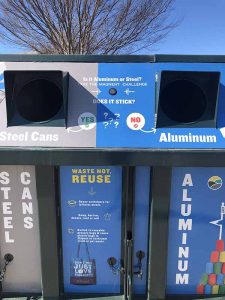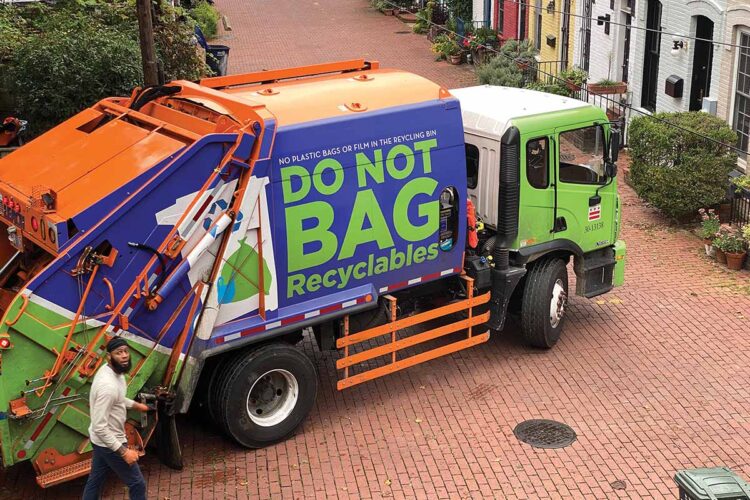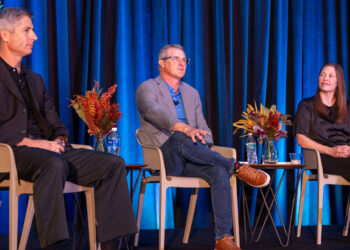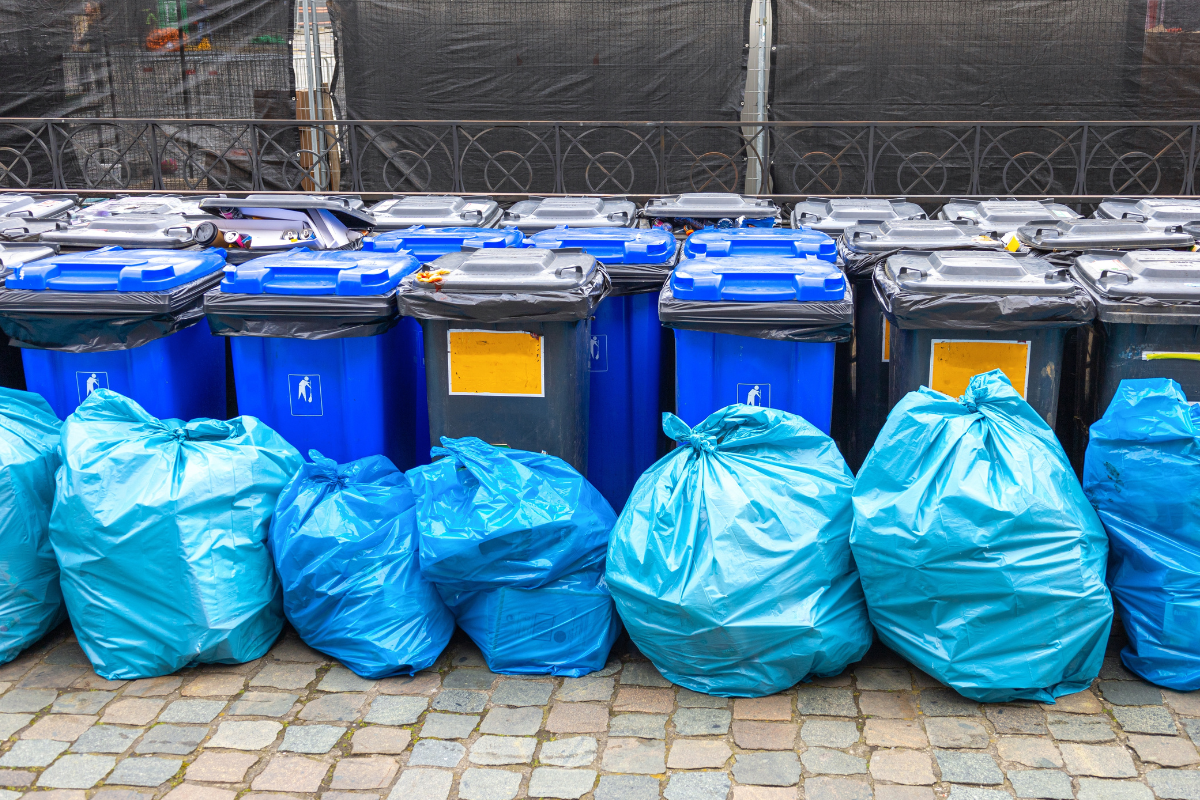Washington, D.C. and Fayetteville, Ark. have been named the 2022 Program of the Year winners by Resource Recycling.
Washington, D.C. picked up the honor after embarking on an intensive contamination reduction outreach campaign that, as of fall 2021, had slashed contamination levels by two-thirds. The work, enabled by support from The Recycling Partnership, helped the DC Department of Public Works (DPW) bring in this year’s Large City award, which honors a city of 150,000 or more residents.
“We were starting to see contamination and the costs start to build, and we really wanted to go after it,” Blake Adams, manager of the DPW’s Office of Waste Diversion, said in a Resource Recycling webinar today announcing the winners. The webinar drew nearly 150 listeners from around North America.
Meanwhile, Fayetteville has gone above and beyond to help residents and businesses divert their food scraps from landfill, even handing out free collection buckets and setting up numerous drop-off centers. The city also conducts robust outreach through multiple avenues. The efforts helped it snag the award in the Small City category, which covers municipalities with fewer than 150,000 residents.
“No education opportunity is too small or too big for us, and education is, of course, a huge part of success in our programs,” said Taylor Gladwin, environmental educator at the city of Fayetteville.
The 2022 Program of the Year Awards were sponsored by Re-TRAC Connect, which provides material management data services to clients throughout the U.S. and Canada. Re-TRAC confirmed on the webinar the launch of a major material management analytics tool later this fall.
District drives down contamination
Over 700,000 people live in Washington, D.C., which uses city crews to collect single-stream recyclables from 105,000 single-family households. Material is delivered to a privately owned MRF for sorting and marketing.
The program handles about 34,000 tons of material annually.
Adams said the city delivers recyclables to a privately owned MRF, which holds the city accountable for contamination. “There was a really strong business incentive for the city to make contamination a focus,” he said.
Materials collected at the curb are a lot cleaner than they used to be, thanks to extensive contamination-reduction efforts. With support from The Recycling Partnership, the DPW provided direct cart messaging to over 25,000 single-family homes in 2021.
The on-the-street outreach occurred in two phases. The first took place from March through May and involved over 17,000 homes. City staff and temporary labor conducted four cart observations per household, leaving warnings when necessary. The work decreased contamination in those carts from 18% to 13%.
The second phase, which occurred September through October, involved nearly 6,500 households. In that phase, city staff and temporary labor conducted five cart observations for households, testing various tagging strategies. The push drove down contamination rates in carts from 13% to 7%.
The targeted campaign in 2021 built on outreach conducted since 2017.
The result of all the outreach: In November 2021, DPW announced the residential contamination rate had fallen to 11%, down from 33% in 2017.
The department notched other notable achievements, as well, including launching a Multi-Family Zero Waste Guide, which functions as a recycling toolkit, and upgrading the department’s Feet on the Street initiative. The latter involved creating in-house and using a mobile software app that improved geospatial data collection reliability in the District of Columbia’s extremely narrow alleys and allowed for a “rejection at the curb” pilot project, which discouraged incorrect recycling behavior.
DPW produced an ArcGIS StoryMap to illustrate the results of its efforts.
During the webinar, Adams also noted that the contamination-reduction program was designed to pay for itself. “By spending a dollar reducing contamination here, down the line we save a dollar,” he said. “It’s meant to be cost neutral.”

Fayetteville works hard to divert food scraps
A city of about 87,000 people, Fayetteville, Ark. uses a source-separated collection system. City crews collect recyclables from nearly 16,600 houses and apartment units and food scraps from commercial establishments.
In 2021, about 6,570 tons of recyclables, 876 tons of food scraps and 17 tons of HHW were collected from homes and businesses in the city. Overall, Fayetteville has a 19% recycling rate, with a contamination rate of less than 2%.
In its application, the city of Fayetteville, which has a goal of 40% diversion from landfill by 2027, noted its robust education efforts.
The city frequently delivers presentations, shares information via the news and social media, leads tours, and participates at events put on by schools, community groups, the public library and environmental education organizations. Over the last year, the city has given at least one recycling and food waste presentation a month.
Fayetteville also takes advantage of multiple opportunities to remove contaminants from the stream. Drivers sort recyclables at the curb and place the materials into different compartments in the trucks. That gives them the opportunity to remove and leave contaminants at the curb, taking only the recyclables. Second, attendants at the drop-off centers pull contaminants out of source-separated containers. Lastly, the recycling center crew removes contaminants as recyclables move into the baler.
“We have hard workers at every step of our process here and they’re pulling out contaminants, if they’re in there,” Gladwin said.
Fayetteville has also taken a number of steps to divert food scraps from landfill. It operates the only city-run residential food waste program in the state of Arkansas. That program, which launched in 2020, now includes a mobile trailer that’s pulled to the local farmers’ market and other events to raise awareness about composting.
The city provides 3.5-gallon and 5-gallon buckets to residents so they can collect their food scraps and bring them to one of the city’s six drop-off locations (the city hopes to expand the number to 10 this year). Those drop-off locations are also specified on “whoops!” bin tags recently developed by the city. During the first year of distribution, the city gave out 635 buckets.
Fayetteville also provides robust recycling services for small apartment buildings, where residents are provided 18-gallon bins for placement at the curb, and for large apartment buildings, which are provided with large, shared recycling containers, dubbed “battleships,” with different compartments for different materials.
“We have a lot of really awesome programs that we’re really excited to be able to offer our residents, to help with our city’s waste-diversion goals,” said Heather Ellzey, an environmental educator at Fayetteville.
The winners were selected from a field of six finalists. Washington competed with Milwaukee and Tacoma, Wash. in the Large City category, and Fayetteville joined Marquette County, Mich. and San Marcos, Texas in the Small City category. For the judging, the Resource Recycling editorial team relied on input from a group of industry professionals representing different segments of the municipal recycling sector.
The Washington and Fayetteville programs will be honored at the 2022 Resource Recycling Conference, which will be held Aug. 15-17 in Austin, Texas. Emerge Knowledge, which owns the widely used Re-TRAC Connect software for local recycling programs throughout North America, is providing financial support to bring representatives of those cities to the conference free of charge.
This year marked the second time Resource Recycling has offered the Program of the Year Awards. Last year’s Program of the Year winners were Grand Rapids, Mich. and Olympia, Wash.





























